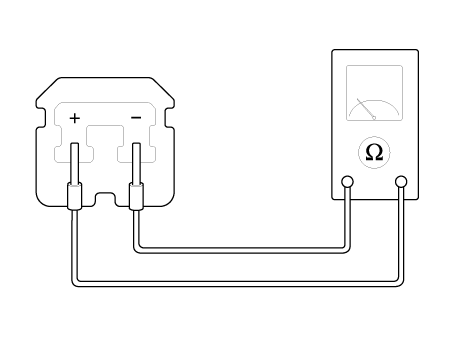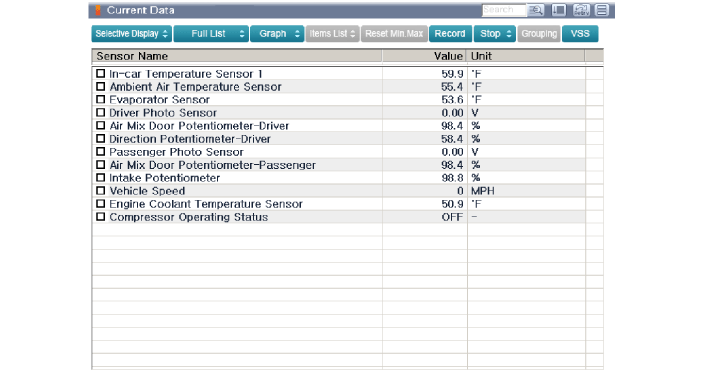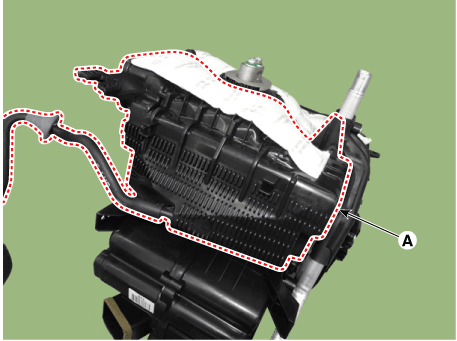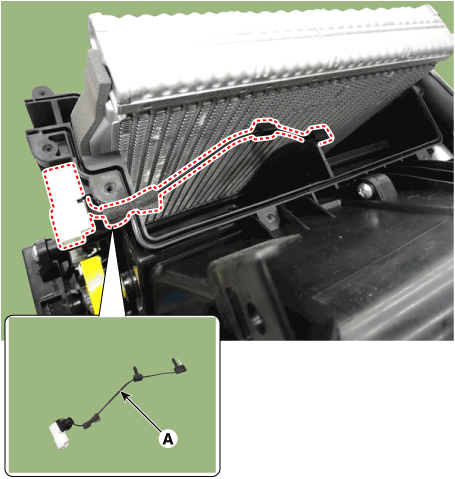Hyundai Ioniq: Air Conditioning System / Evaporator Temperature Sensor. Repair procedures
Hyundai Ioniq (AE) 2017-2025 Service Manual / Heating, Ventilation and Air Conditioning / Air Conditioning System / Evaporator Temperature Sensor. Repair procedures
| Inspection |
| 1. | Turn the ignition switch OFF. |
| 2. | Disconnect the evaporator temperature sensor connector. |
| 3. | Measure the resistance between terminal "+" and "-" of the evaporator temperature sensor.
Specification
|
| Diagnosis With GDS |
| 1. | The heating, ventilation and air conditioning can be quickly diagnosed failed parts with vehicle diagnostic system (GDS). ※ The diagnostic system (GDS) provides the following information. (1) Self diagnosis : Checking the failure code (DTC) and display. (2) Current data : Checking the system input/output data state. (3) Actuation test : Checking the system operation condition. (4) Additional function : Other controlling such as he system option and zero point adjustment. |
| 2. | Select the 'Car model' and the system to be checked in order to check the vehicle with the tester. |
| 3. | Select the 'Current data' menu to search the current state of the input / output data. The input/output data for the sensors corresponding to the Evaporator Temperature Sensor can be checked.
|
| Replacement |
| 1. | Disconnect the negative (-) battery terminal. |
| 2. | Remove the heater and blower assembly. (Refer to Heater - "Heater Unit") |
| 3. | Remove the evaporator core cover (A) after loosening the mounting screws.
|
| 4. | Pull out the evaporator temperature sensor (A) from the evaporator core.
|
| 5. | To install, reverse the removal procedure.
|
 Evaporator Temperature Sensor. Description and operation
Evaporator Temperature Sensor. Description and operation
DescriptionThe evaporator temperature sensor will detect the evaporator core temperature and interrupt compressor relay power in order to prevent evaporator from freezing by excessive cooling...
 In-car Sensor. Description and operation
In-car Sensor. Description and operation
DescriptionThe In-car air temperature sensor is built in the heater & A/C control unit.The sensor contains a thermistor which measures the temperature of the inside...
Other information:
Hyundai Ioniq (AE) 2017-2025 Service Manual: Description and operation
DescriptionThe changed position of the seat by memorizing into the power seat unit with IMS switch controlling the optimal seat position set by the driver can be restored with the IMS switch. It has the function of prohibiting the restoring action during driving and emergent stopping the linked motion for safety...
Hyundai Ioniq (AE) 2017-2025 Service Manual: Front Disc Brake. Components and components location
C..
Categories
- Manuals Home
- 1st Generation Ioniq Owners Manual
- 1st Generation Ioniq Service Manual
- Coasting Guide (Plug-in hybrid vehicle)
- Immobilizer System
- Hybrid battery SOC (State of Charge) gauge
- New on site
- Most important about car
Side view mirror control
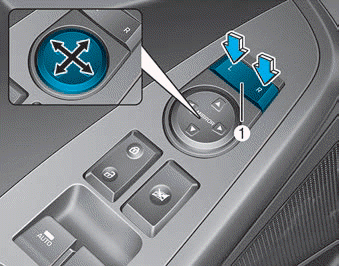
Adjusting the side mirrors:
1. Press either the L (driver's side) or R (passenger's side) button (1) to select the side view mirror you would like to adjust.
Copyright © 2025 www.hioniqae.com

